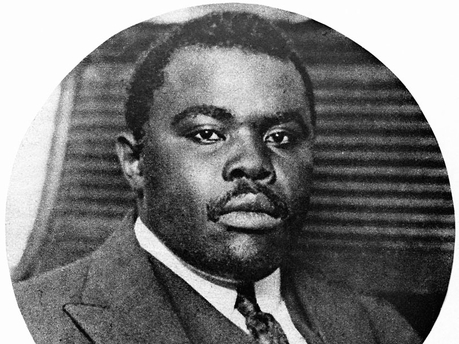 Happy Juneteenth! The joy of Emancipation quickly yielded to grief after the Compromise of 1877 triggered a new round of repression of Black Americans. Since that time, Black Americans have debated and employed a range of strategies to fight racial oppression. One of those is nationalism, so this seems an appropriate day for me to update an extended review (originally published in an academic newsletter) of four books on one well-known exponent of that view: Marcus Garvey.
Happy Juneteenth! The joy of Emancipation quickly yielded to grief after the Compromise of 1877 triggered a new round of repression of Black Americans. Since that time, Black Americans have debated and employed a range of strategies to fight racial oppression. One of those is nationalism, so this seems an appropriate day for me to update an extended review (originally published in an academic newsletter) of four books on one well-known exponent of that view: Marcus Garvey.
Books discussed in this essay:
Cronon, E. David (1955/1969). Black Moses: The story of Marcus Garvey and the Universal Negro Improvement Association. Madison, WI: University of Wisconsin.
Fax, Elton C. (1972). Garvey: The story of a pioneer Black nationalist. New York: Dodd, Mead & Company.
Hill, Robert A., & Bair, Barbara (Eds.). (1987). Marcus Garvey: Life and lessons: A centennial companion to the Marcus Garvey and Universal Negro Improvement Association Papers. Berkeley, CA: University of California Press.
Martin, Tony. (1983). Marcus Garvey, hero. Dover, Mass: The Majority Press.
On March 23, 1916, a flamboyant and eloquent activist named Marcus Garvey arrived in Harlem with plans to bring African-Americans a program of economic and spiritual renewal, autonomy, and self-reliance that he had developed in his native Jamaica. His original hope of securing the support of Booker T. Washington was dashed when The Sage of Tuskegee died just prior to Garvey’s journey. As Garvey explains in his essay “Aims and Objects of the United Negro Improvement Association (UNIA)” (Reprinted in Hill and Bair’s collection of Garvey’s papers), he decided that even without Washington’s assistance, he could personally inspire and lead a worldwide movement that would create a sense of unity and racial pride among all people of African descent, promote mutual help among Blacks, oppose European colonialism in Africa, and develop a self-supporting network of Black-controlled businesses and educational institutions. In the words of Elton Fax, these goals clearly did not “suffer from the encumbrances of modesty” (p.58), but Garvey’s indefatigable spirit and organizational ability enabled him to come impressively far towards meeting them before internal and external enemies brought the man and his movement to a crashing halt by the close of the 1920s.
Of the four books discussed here, E. David Cronon’s Black Moses is the most comprehensive and best documented, and thus serves as the best introduction to Garvey’s life and works. Through painstaking research, Cronon tracked down Garvey’s surviving family and friends and unearthed valuable published and unpublished sources. Cronon begins his story in St. Ann’s Bay, Jamaica, where Garvey was born in 1887 and named after his father Marcus Garvey Sr.. Although the Garvey family was initially financially stable, they suffered a steady decline in their fortunes as Marcus Garvey Sr. became increasingly prone to paranoia, irrational outbursts, and disastrous business decisions (problems with which Marcus Jr. himself would later struggle). A particularly sad index of the family’s difficulties is that of the 11 Garvey children, only Marcus Jr. and his sister Indiana lived to maturity. Marcus was a bright and inquisitive child, but received little formal education because his family’s economic situation required him to work. Garvey’s shame about his lack of education never abated, and later fueled his envy and vituperation of his Harvard-educated arch-rival, Dr. W.E.B. DuBois of the National Association for the Advancement of Colored People (NAACP).
As a young man, Garvey supported himself and his family by working as a printer. He was highly skilled at his trade and became a master printer and foreman at The P.A. Benjamin Company by the age of 20. In 1907, unionized workers at the company went on strike for higher wages, and elected Garvey to be their leader. Unfortunately, the strike was broken when the union treasurer embezzled the strike fund and the company imported linotype machines and scabs to replace the striking workers. Although the strikers were re-hired, Garvey was blacklisted by the printing industry in Jamaica for his role as organizer. This bitter experience made Garvey permanently skeptical of the value of labor unions, and lead him to look for alternative means to improve the lot of Blacks. Continue reading “Remembering Black Nationalist Marcus Garvey”